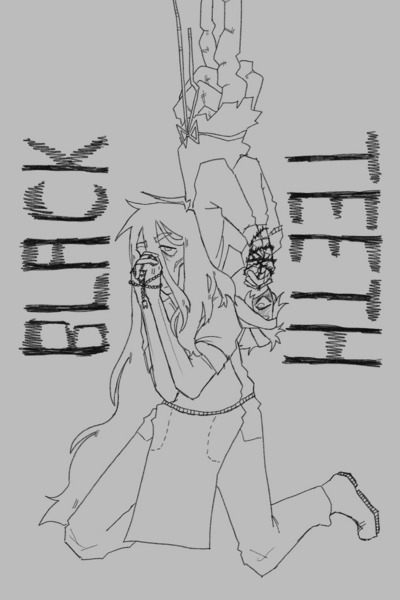It would be exactly 4 years, 248 days, 7 hours, and 13 minutes until Machiavelli saw his children somehow alive again. Just now, he watched the road belch out a cloud of dust as his son sped away from the house. The house. That boy’s childhood home. That boy–he was 24 now, but Machiavelli could only picture his son’s scraped knees and blistered face from years past. The man sighed and turned back towards the front door. Orange leaves skittered in the October wind as Machiavelli walked up the concrete steps. Houseflies probably occupied the space where his son once stood, given how he’d let the door hang loose for over 20 minutes. Machiavelli yanked the door closed as he walked inside.
The overcast day did no favors to the front of the house. The place wasn’t dusty–Machiavelli made sure of that–but the dim silver light somehow aged the couches, chairs, and coffee table. The illusion was enough to make Machiavelli sweep the top of the closest couch with his hand. No dust came up. Many things aren’t as they seem when you grow older, when your son drives away in a fury. Machiavelli flicked on a lamp and headed toward the kitchen, frowning. He wasn’t hungry, not really. Hadn’t been for a while–the emotions of the day made his appetite withdraw. But it was a place to go that didn’t have framed photos of his family on the wall.
Machiavelli sat on a reliable wooden barstool fixed near the end of the kitchen’s island. When he leaned forward, his hair spilled down onto the countertop like a sickly river. When did it get this long? As the hair made a shifting curtain around his head, the man couldn’t help but think about the movies his son watched. A girl climbed out of a well, her hair a similar curtain to his own. Mikhail had put a sheet over his TV and crept around the house at night for a week after watching that movie. Did Machiavelli look that frightening? Maybe Mikhail would put a sheet over any images of his father. Maybe Machiavelli should hide the pictures in the living room. No. No, that would be too much. A part of him wondered if Mikhail would wander home in the evening, repentant, pressing his fingers along the darkness like he did years ago. It would be exactly 4 years, 258 days, 7 hours, and 4 minutes until Machiavelli saw Mikhail alive again.
When Machiavelli finally pulled his hair back, his eyes glanced up to the clock. 9:05 in the morning. His first client would be here shortly. There’s no time to waste.
–
“Good morning, Mr…” Machiavelli’s eyes drifted down the page. “Mr. Limbus.”
The client made no attempt to respond outside of a subtle nod.
“My name is Dr. Machiavelli. It’s a pleasure to meet you.”
When Machiavelli stretched out his hand, Mr. Limbus gave it one firm shake before standing up.
“We organized this meeting over the phone, but of course there is paperwork to be done…” Machiavelli released Mr. Limbus’ hand and made his way over to his front desk. His client tilted his head in silent observation as Machiavelli’s thin fingers flitted through a stack of papers. Soon after, Mr. Limbus held a clipboard loaded with several sheets from the stack.
“Sit right back down and fill those out,” Machiavelli said, “I won’t be far.”
The doctor sunk down into his desk chair, retying his hair at his neck. Mr. Limbus steadily wrote down his information, same as any other client. The man made virtually no noise, but the dark circles under his eyes gave enough as to a reason why. Minutes ticked on. Machiavelli tapped his desk rhythmically, a habit he had taken on only after he chewed his nails into near-nothingness. Even now several fingers had loose bandages covering them.
While in the middle of pondering the bandages, Mr. Limbus placed the clipboard on Machiavelli’s desk. The doctor swept up the papers and attached credit card. Within moments the card was back in Mr. Limbus’ possession. The man blinked and opened his mouth to speak before Machiavelli placed a firm hand on his back and ushered him deeper into the building. The front of his house contained the living room and stairs to the second floor, where the kitchen and bedrooms occupied the bulk of the space. The backside was fixed into a facsimile of any other doctor’s office, with sterile white lighting, bone-pale floors and walls, and cabinets of medical equipment. Of course, Machiavelli had curated his equipment to his expertise–probes, brushes, pliers, and anesthetics. Mr. Limbus stepped into what once was a study. His hands brushed against the chair in the center of the room, and the surrounding cabinets appeared to look towards him, contents obscured by tinted glass. Machiavelli stood in the empty doorway.
“Take a seat,” The doctor said simply. Mr. Limbus obliged.
Let me depict the scene and the state of Mr. Limbus’ mind. To a child, Doctor Lysander Machiavelli was the chief of the demons, the head of all things uncomfortable and intrusive to a young mind. He was a dentist. Now, Mr. Limbus was not a child. He had a lovely wife working as a firefighter and a couple short discussions with her about having children, or so it goes. He was far past the fear of dentists nearly expected from those a quarter of his age. But now he watched this willowy shape of a man, lanky and angled, pull blue latex gloves over his slender fingers. He watched the man’s stringy grey hair drift along his back as he turned away and pulled a cart closer. He watched a cloth surgical mask obscure the man’s lower face, highlighting his sharp, ever watchful eyes. Mr. Limbus held back a shutter as the doctor’s shadow fell over him, and he recalled the firm hand on his back moments prior. The doctor’s stature shrunk Mr. Limbus in comparison. A taste of that old fear hit his brain like a midsummer’s brain freeze. Machiavelli draped a dental bib over his client’s chest, which tried not to betray his fear in its steady rise and fall. The overhead light cast an intense gleam upon the tools dotting the cart.
“Now,” The doctor did not smile, “what seems to be the problem?”
Mr. Limbus sputtered and finally spoke. “Just a routine check-up,” he began, “It’s been quite a while since I’ve seen a dentist, and I brush ‘n all that, but…”
“But some expertise may serve you well.”
“Yes. Yes, expertise,” Mr. Limbus nodded.
“Then I’ll get to it. A cleaning,” The doctor said, “Open your mouth, but don’t cover your lower teeth with your tongue.”
Mr. Limbus once more did as he was told, and Machiavelli looked down into the man’s jaw. He lowered a mouth mirror into the pit, a solitary cave diver, moving Mr. Limbus’ lip up and down as he scanned the area. The man had indeed kept his teeth in good condition–hardly a crack, cavity, or the remnants of either in sight. A lesser dentist would scoff at this nothingness of a job. A lesser dentist would lie and say there is more work to be done in order to achieve a higher paycheck. Machiavelli was not a lesser dentist. He released his hand from Mr. Limbus’ lip and reached for a sickle probe, a companion to the mouth mirror. The sharp tip plucked at the space between Mr. Limbus’ teeth, guided by meticulously disciplined hands. Occasionally the probe poked into the gums or reopened the lips after a lack of focus made the pair wish to reunite. Mr. Limbus could only look towards Machiavelli or the popcorn ceiling. He prayed for no taste of copper to meet his tongue, but the doctor was merciful and shallow in where his probe touched. Thankfully, Machiavelli’s hair tie kept the area free of unwanted hair, clearing the view above. The long strands along his back swayed with his movements as if they composed a languid tail. The motion caught Mr. Limbus’ eyes as the doctor continued his work.
After several minutes of light scraping and prodding, Machiavelli stepped back and set his tools down. Mr. Limbus sat up in the dental chair, closed his mouth, and rubbed his chin. However, this reprieve lasted mere seconds as Machiavelli hooked up a small rotary brush to a cord. With a press of a button, the brush sprung to life, and Mr. Limbus’ eyes widened. Noticing his pale face, Machiavelli turned the brush off and faced his client once more.
“How long has it been since you’ve visited a dentist before me?” he said.
“Mm, ah…” Mr. Limbus believed he noticed some softness in Machiavelli’s half-covered expression, “Hard to say. I’ve moved all around the place and only have now settled down…”
“I see,” The doctor nodded. “You’re a married man, I assume?”
“Indeed. And you?”
“No longer. But I have no ill will towards her, or you, or any client,” Machiavelli said. “You wear your heart on your sleeve, or so the saying goes.”
“I’m not quite sure what you mean,” Mr. Limbus responded.
“Are you nervous because you are here, or because you have other places to be?”
Before Mr. Limbus could respond, Machiavelli squinted and continued speaking.
“I see the look on your face, and I assure you any work I need to do will not be that of a monster. You need your teeth cleaned, and this,” Machiavelli indicated the rotary brush, “hurts less than all the scraping from a moment ago. I promise.”
Mr. Limbus felt a wave of guilt wash over him. What a childish fear, refuted by dozens of visits and routine examinations. Sure, Machiavelli moved between actions with the cold composure of a mannequin, showing no wrinkles of a smile around his eyes. But Mr. Limbus did not know him, the day he had endured, or anything of the sort. And here he was, shaping a monster from the vague shapes of a dentist, anxiety, and uncertainty.
“That’s good to know,” Mr. Limbus gave a small smile, “I apologize for my nervousness.”
“It’s no problem. I simply try to confront my clients’ fears of me as I see them,” Machiavelli sighed, as if this were a common conversation, “Now, shall we continue?”
“Yes, go on,” Mr. Limbus relaxed in the seat.
Machiavelli leaned over the chair and opened his client’s mouth wider with his fingers. The strain on Mr. Limbus’ jaw made him wince, but the doctor had hooked his empty hand along his chin and mouth with a resolute, but not unkind, firmness. There was no movement to be made. Outside of this–and by some miracle, an anxiety-riddled part of Mr. Limbus thought–the rotary brush caused no pain. The tip worked its way through Mr. Limbus’ mouth with a touch of pressure, a miniature masseuse. Machiavelli watched in silent satisfaction as the brush smoothed away the plaque and grime. He swiveled, stopped, rinsed off his brush, and returned to cleaning several times in a complex dance of dentistry. Mr. Limbus’ mind wandered far away. But before long, Machiavelli stepped away and turned off the brush one final time. He replaced the brush with a set of small tubes, one metallic and the other a soft plastic with slits on the top. Machiavelli met Mr. Limbus’ gaze.
“This one is a rinser,” Machiavelli raised the metallic tube slightly, “and the other suctions all the water out. It won’t hurt you to swallow plaque and such, but it’ll make you feel refreshed. Like how you use mouthwash or water to clean up after brushing.”
Mr. Limbus nodded, already feeling better than he did earlier. He rubbed his jaw once more before speaking.
“I see! I appreciate the explanation. Maybe it has been too long…”
“You might just have other things to think about,” Machiavelli shrugged, “I work with these tools nearly every day, so they’re second nature. But something like… ah, plumbing tools, for instance. Those are completely outside of my realm of knowledge even if I’ve seen them before.”
“That makes sense,” Mr. Limbus nodded, “And also, some dentists I’ve been to have had music or TVs or similar on. So perhaps I haven’t paid much attention before.”
Machiavelli’s face briefly distorted into a look of surprise, returning some life to his otherwise rigid face. “Ah… hm, I must have forgotten to turn on the radio this morning… I apologize, this must have made things quite awkward…”
“It’s no problem, really, sir,” Mr. Limbus smiled.
“No, I need to turn on some music now. One moment, please…” Machiavelli placed the rinser and suction tube back on the cart before walking quickly out of the room. All Mr. Limbus could do was watch him go. He glanced at the cart and back towards Machiavelli’s fleeting form.
Machiavelli zipped straight towards the radio in his waiting room. The radio sat on a thin-legged table that reached just under Machiavelli’s chest. A series of button presses brought the machine to life. A little twist of the volume this way, a little twist for the bass, flicking between stations, clips of voices and instruments fluttering by… and there it was, some casual jazz station of some kind, a safe go-to for any client. Machiavelli’s face warmed in silent embarrassment about forgetting this part of a comfortable experience. He sat for a moment and listened to the music with closed eyes. The music on the station began rattling the drums, clanging the cymbals, drowning out the other instruments. At first, the sound meshed well, a harmony so developed that Machiavelli could almost picture the musicians. As he stood back up, however, the banging of the drums grew louder, discordant, out of tune and time. Machiavelli quickly turned the volume and bass down, but the noises persisted at the same intensity. When he turned the radio’s volume even lower, Machiavelli realized the noises weren’t from the music at all. He turned around.
The back door. A series of thunderous hits made the wood quiver. For a split second, Machiavelli considered grabbing a weapon, at least something heavy. But he recalled that the back door was unlocked during working hours. Why all the knocking, then? Maybe he had locked it after Mr. Limbus came in? No, Machiavelli was seated at his desk or with the man ever since he arrived. There was no peep hole, no windows nearby. As the radio hummed, Machiavelli grabbed the largest book from the coffee table–a chunky encyclopedia of birds–and walked towards the door. One arm hung behind him, carrying the book, and the other gripped the metal knob. A simple click, and the door creaked open, interrupting the dwindling knocks.
A man spilled out onto the floor before Machiavelli’s feet.











Comments (0)
See all